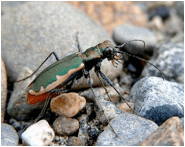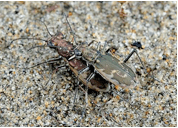Home → Fish & Wildlife → Wildlife → Species Information → Invertebrates → Rare Tiger Beetles
Rare Tiger Beetles
Tiger beetles are handsome, active insects that make their living running down smaller insect prey on the ground. These terrestrial beetles move so fast that they even sometimes outrun their eye-sight and have to pause to refocus ? a behavior that aids in quick identification of adults in the field. Though many are dark colored and camouflage nicely with their preferred sandy or muddy habitat, some species can be quite striking in appearance with iridescent colors or intricate body patterns.

Cobblestone Tiger Beetle
photo by Jonathan Mays

Salt Marsh Tiger Beetles
photo by Jonathan Mays
Maine is home to 14 species of tiger beetles, three of which are considered rare due to their limited range and specialized habitat requirements - the Cobblestone Tiger Beetle, Saltmarsh Tiger Beetle, and White Mountain Tiger Beetle. The Cobblestone Tiger Beetle was only recently discovered in Maine during surveys conducted by MDIFW in 2009. This species with its distinctive markings and orange abdomen is known from just a handful of rivers throughout its range and is considered globally imperiled. The newly discovered Maine population fills a critical distribution gap and offers additional hope for this species’ recovery. As the name implies, the Cobblestone Tiger Beetle prefers cobble bars on vegetated islands in medium to large rivers. It appears these rivers need seasonal scouring of the cobble beaches but not prolonged flooding. Due to an apparently limited range (at present a 10 km stretch of a single river) and specialized habitat, the Cobblestone Tiger Beetle was recently state-listed as Special Concern and is a candidate for future Endangered or Threatened status. Additional surveys during 2010 and 2011 were unsuccessful in finding other populations of the beetle.
MDIFW also surveyed coastal salt-marsh areas for another Special Concern species, the Salt Marsh Tiger Beetle. This species appears to be declining in the Northeast: ‘Possibly Extirpated’ in New Hampshire; ‘Critically Imperiled’ in Rhode Island, Connecticut, and Delaware; and ‘Vulnerable’ in New York. Salt Marsh Tiger Beetle habitat is limited in Maine and threatened by tidal erosion, rising sea levels (per climate change models), human development, and coastal oil spills. The species status remains precarious in Maine, as the 10 known sites represent most if not all the available habitat for this specialized salt-marsh dweller.
Funding for this work comes from the federal State Wildlife Grants program, and state revenues from the Outdoor Heritage Fund, Loon Conservation Plate, and Chickadee Check-off.